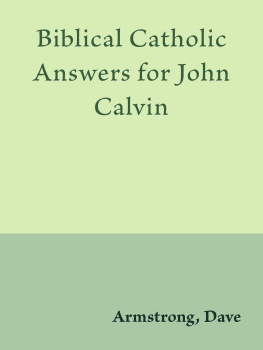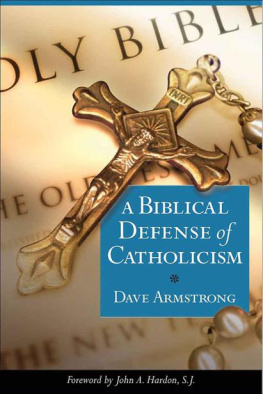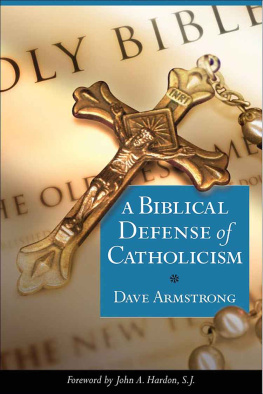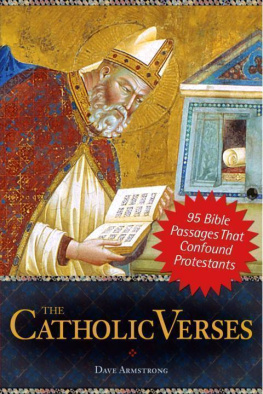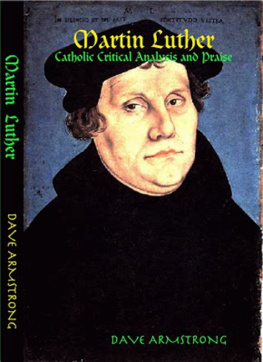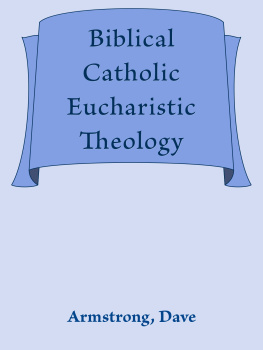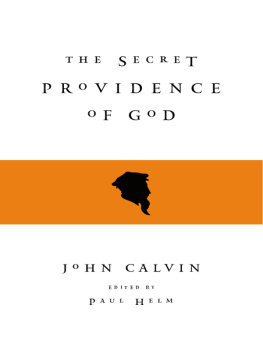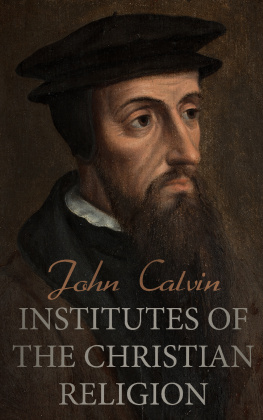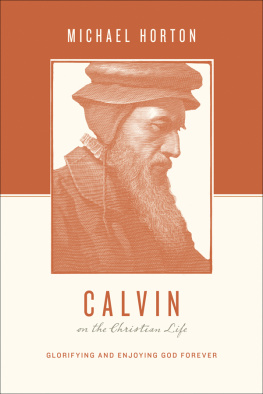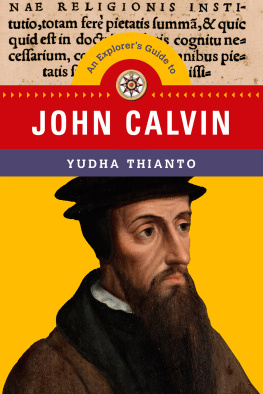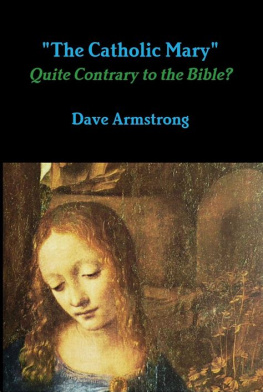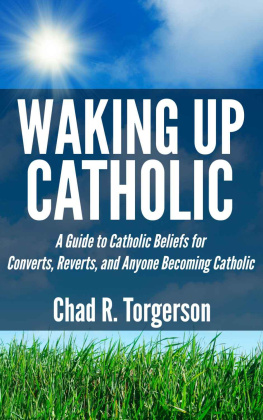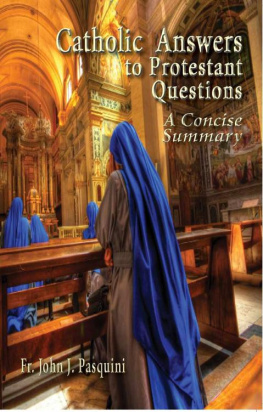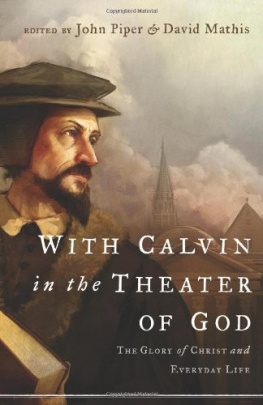Biblical Catholic Answers for John Calvin
Dave Armstrong
Copyright 2010 by Dave Armstrong
All rights reserved.
Biblical citations are from the Revised Standard Version of the Bible ( 1971) copyrighted by the Division of Christian Education of the National Council of the Churches of Christ in the United States of America. All emphases have been added.
For related reading on the authors blog, see the following web page:
John Calvin, Calvinism, and General Protestantism
http://socrates58.blogspot.com/2006/11/calvin-calvinism-index-page.html
DEDICATION
To my Reformed Protestant brothers and sisters in Christ, for whom I have a great deal of respect. May we rejoice in the common ground that we have, and be cordially open and honest with each other, as fellow Christians, when we disagree
INTRODUCTION
For quite a while now, Ive desired to make an in-depth, point-by-point reply to large portions of John Calvins monumentally influential work of systematic theology, The Institutes of the Christian Religion . Calvin is, quite arguably, the most articulate and meaty Protestant theologian, and certainly one of the most systematic.
Ive done a great deal of research on Martin Luther, so it is long overdue for me (as a Catholic apologist) to start paying relatively more attention to the other important figure in the Protestant Revolt: John Calvin. In many ways, Calvin has had even more influence in the subsequent history of Protestantism than Luther himself. Much of Calvins subject matter in his famous tome gets to the heartthe very cruxof the disagreement between Catholics and Protestants.
Ill be utilizing for my purposes, the Institutes of the Christian Religion , translated by Henry Beveridge for the Calvin Translation Society in 1845, from the 1559 edition in Latin; reprinted by William B. Eerdmans Publishing Company (Grand Rapids, Michigan), 1995, and available online at the wonderful Christian Classics Ethereal Library site:
http://www.ccel.org/c/calvin/institutes/institutes.html
This work is in the public domain because of its age. That being the case, I was able to easily cut and paste everything in it, without a great deal of extra typing being necessary. This allowed me to easily reply in my preferred socratic manner, and to go back and forth with Calvin.
My biggest interest lies in Book IV: Of the Holy Catholic Church . It runs about 500 pages. This is where the real contrast between Calvinism and Catholicism is most evident, in my opinion: even more than in soteriology, or the theology of salvation (Book III), where the two sides are far closer than many in both parties (including John Calvin himself) realize. I like to go right to the heart of any given issue, and thats located here, in my opinion.
In the much longer online version of my replies (entries listed on my Calvin and Calvinism web page, noted on the copyright page above), I responded line-by-line to the entirety of Book IV of the Institutes . For my purposes in this book, and for the convenience of reference, I have edited, abridged, and reorganized that material, and have added additional related replies of mine having to do with John Calvin.
Calvin, of course, has the big advantage going in, in such a debate. Hes the famous and extremely influential theologian and scholar, with lots of formal education, rhetorical and literary ability in droves, and a remarkable encyclopedic knowledge in many areas. Im just a lay Catholic apologist with a degree in sociology, and no formal theological education (but with lots of informal theological education for over thirty years).
I rather like that. I love to play David over against a Goliath. I relish the challenge, and this was assuredly one that took a lot of effort and very hard work on my part: with intense research often required. Calvin cant counter-respond, but such is the necessary disadvantage of being dead for almost 450 years. Calvins superior education makes up for his deceased status.
If it is concluded that I prevail here and there in my replies, then it will bring (all the more) the point home that, as we believe, Calvin was wrong in his arguments, where he opposed the Catholic Church. Im confident that he has been, throughout my replies, very often plainly shown to be in error. Ive often noted that one may be the greatest genius of all time, but if the facts and the truth are not on ones side, even an infant who knows the truth can get the better of them in discussion.
I gave it my best shot. You, the reader, are the judge and jury. You can and should decide where the truth lies. Read and consider Calvins arguments and then ponder the replies that this one orthodox Catholic gives, and make up your own mind. I have always advocated the process of reading two opposing arguments and then deciding which one is more plausible; which has the ring of truth to it.
In conclusion, I would like to respond to objections I have already heard, even before this book was published. A few (minority anti-Catholic type) Reformed Protestants, familiar with my apologetic work and highly critical of it, have questioned whether I am qualified at all to undertake such a project as this.
My response has been twofold. I stated, first of all, that if I were as profoundly ignorant and underinformed and unqualified as they made out, then Calvinists had nothing whatever to fear from this book, or the larger set of online replies, as they would be their own refutation, and self-evidently absurd.
Their very protest, then, seemed to suggest that they feared such a reply far more than their words were letting on. Why worry about it? I can do no harm to their cause if they are correct about my alleged utter lack of qualifications.
The second defense I made was to appeal to Calvins own claims for his work, and its intended audience. It was not supposed to be for scholars and theologians only, but rather, primarily for students and laymen (just as St. Thomas Aquinas Summa Theologica was intended as introductory instruction). He expresses this in several introductory comments to The Institutes . For example:
My intention was only to furnish a kind of rudiments, by which those who feel some interest in religion might be trained to true godliness. in a simple and elementary form adapted for instruction. what I have here given may be regarded as a summary
( Prefatory Address , Basle, 1536)
http://www.ccel.org/ccel/calvin/institutes.ii.viii.html
[M]y object in this work was to prepare and train students of theology for the study of the Sacred Volume, so that they might both have an easy introduction to it, and be able to proceed in it, with unfaltering step, seeing I have endeavoured to give such a summary of religion in all its parts, and have digested it into such an order as may make it not difficult for any one, who is rightly acquainted with it, to ascertain both what he ought principally to look for in Scripture, and also to what head he ought to refer whatever is contained in it.
( Prefatory Epistle to the Reader , 2nd edition, Strasbourg, 1539)
http://www.ccel.org/ccel/calvin/institutes.ii.ix.html
[I]t is the duty of those who have received from God more light than others to assist the simple in this matter, and, as it were, lend them their hand to guide and assist them in finding the sum of what God has been pleased to teach us in his word. it will be a kind of key opening up to all the children of God a right and ready access to the understanding of the sacred volume. a summary of Christian doctrine, an introduction to the profitable reading both of the Old and New Testament.
( Subject of the Present Work , French edition, Geneva, 1545)
http://www.ccel.org/ccel/calvin/institutes.ii.x.html
Next page
